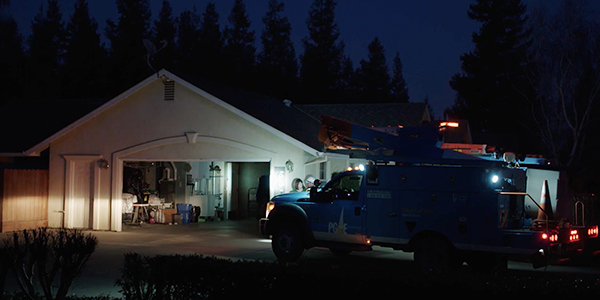By Hudson Sangree
The California Public Utilities Commission issued proposed guidelines Thursday for utilities to follow in the 2020 fire season when intentionally blacking out areas to prevent electrical equipment from starting wildfires.
At the same time, CPUC President Marybel Batjer issued a ruling calling Pacific Gas and Electric’s reporting to the commission on its public safety power shutoffs (PSPS) “fundamentally inadequate” in detail and substance and ordering it to immediately fix the situation.
“PG&E’s performance during PSPS events in 2019 was unacceptable and cannot be repeated in 2020,” Batjer said in a statement. “The reports that I ordered PG&E to submit are part of the CPUC’s comprehensive review of the 2019 PSPS events.”
The proposed guidelines, issued for public comment, would require the state’s investor-owned utilities to restore power no more than 24 hours after the end of weather conditions that led to a safety shutoff. The IOUs would also have to convene monthly regional workshops with local governments and others on fire safety practices and to conduct PSPS exercises with public safety agencies in fire-prone areas.
The proposed PSPS guidelines would augment the guidelines established by the CPUC in a June decision (19-05-042).
PG&E was heavily criticized for failures in preparedness and communication when it blacked out 2.4 million residents in October. Officials, including Gov. Gavin Newsom and his appointee Batjer, have insisted the situation can’t reoccur. (See California Officials Hammer PG&E over Power Shutoffs.)
The utility is in bankruptcy following two years of catastrophic wildfires in 2017 and 2018 that killed dozens of people and destroyed thousands of structures. It mostly avoided a repeat of the past two fire seasons in 2019, but its decision to de-energize vast swaths of Northern and Central California for days at a time caused controversy.
CEO Bill Johnson told state lawmakers in November that the power shutoffs had prevented fires, though improvements were needed.
“Turning off power for safety is an effective tool and really only one of the many tools we are using,” Johnson said. “We will get better at using it.”
In her assigned commissioner’s ruling Thursday, Batjer said PG&E’s reports to the commission on the shutoffs last fall had “serious deficiencies” — and that the utility eventually stopped filing reports altogether in December because it unilaterally decided it had fulfilled its obligations to the CPUC.
The weekly reports were instituted in response to a letter Batjer wrote to Johnson on Oct. 14, citing serious “failures in execution” in the shutoffs and ordering corrective action. (See CPUC Orders Changes to PG&E Shutoff Rules.)
The reports initially took the form of letters from PG&E to Batjer, but an administrative law judge later formally incorporated the reports into the CPUC’s rulemaking on de-energization. Batjer’s ruling Thursday was part of that proceeding (18-12-005). In it she ordered PG&E to resume regular (biweekly) reports on its PSPS corrective actions and to provide the CPUC with a detailed plan in 15 days describing PG&E’s anticipated improvements and challenges regarding PSPS events in the fire season that starts this summer.
Within 45 days, the utility must update its PSPS protocols and be prepared to exercise the measures, without prior notice, in conjunction with the state Office of Emergency Services and the California Department of Forestry and Fire Prevention, Batjer said. She did not propose any penalties in her ruling.
“Based on the identified deficiencies in PG&E’s reporting on its post-PSPS corrective actions to date, I am directing further action to ensure that PG&E is adequately operationalizing the clear guidance we have provided and implementing corrective actions that will meaningfully mitigate the impact of any future PSPS,” the CPUC chair wrote.






